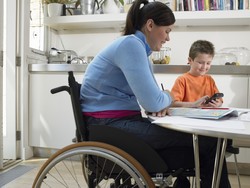More inclusion for people with disabilities
The EU-funded project DISCIT(opens in new window) (Making Persons with Disabilities Full Citizens - New Knowledge for an Inclusive and Sustainable European Social Model) has identified conditions that prevent persons with disabilities from taking full advantage of their rights as citizens in the EU and affiliated European countries. Active Citizenship for people with disabilities can be explained in reference to three categories: security, autonomy and influence. Security can mean fulfilling social obligations, avoiding poverty traps or inappropriate conditions for receiving financial support or services, and promoting individual or collective security efforts. Living independently in a community and participating in paid work are all pathways to autonomy. Persons with disabilities can influence their own environment by participating in discussions with relevant authorities/service providers to influence the quality and content of personal services. Using the United Nations (UN) Convention on the Rights of Persons with Disabilities (CRPD), DISCIT has identified ways to more effectively remove and prevent physical, attitudinal, social and organisational barriers to Active Citizenship. The team collected information and experiences and synthesised policy lessons from a strategic sample of European states. The results provide new insights into how the EU can support Member States and affiliated European countries. For example, the project published a study on the feasibility of remodelling data sets from selected surveys in DISCIT countries. DISCIT collected, reviewed, synthesised and published information on numerous related disability topics. DISCIT participated in and presented and discussed the results of the project at international and national workshops and conferences. A number of new policy briefs have been published and distributed through the website. A dissemination event on how to enhance equal participation of persons with disabilities as workers, customers and consumers also took place. To strengthen impact, DISCIT has helped to expand the collaboration and dialogue with National Stakeholder Committees and other stakeholders at national and European levels. All these activities and more publications will contribute to a new understanding of disabilities to help to reduce barriers to integration and increase participation on equal terms.



